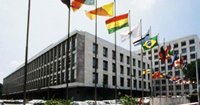The FAO of the United Nations is an international organisation which aims to solve this kind of problem, but to fulfil its mission, the only power the organisation has at its disposal is the capacity to gather the states, the European Union and the Feroe Islands (153 participants). With so little power, nobody is surprised if the organisation is not able to provide concrete and efficient results.
The cleavage which showed up during the meeting was quite original. The main question was about whether the development of the biofuels was positive or negative for the future.
These biofuels contain ethanol realised through crops like sugarcane and corn. The interest of such energy comes from its capacity to be independent from the petrol which price and future are far from being acceptable for many countries.
The debate was consequently on whether the subsidies and protective tariff policies were diverting land, which should produce food to feed human beings instead of producing fuel for engines.
Although these discrepancies were foreseen before its start, the results of the summit were very disappointing.
Agriculture policy from an EU point of view
The future energy supply of the European Union is far from certain. The dependency on petrol and gas producers pushes the States and the various EU institutions to increase the level of autonomy from abroad. Although it is true that no technical solution should be put aside - due to the lack of mature technology to ensure the after petrol era - biofuel production seems far from capable of substituting the petrol demands inside the EU. The reason behind is the high level of land necessary to produce the necessary energy consumed today from petrol.
The determination of some countries (mainly agricultural based ones) in promoting the biofuels should be seen more as a way of saving their agriculture industry rather than as a real attempt to substitute petrol.
Additionally, this biofuel vision is not shared among all the member states of the European Union. Some, used to import food, are not so keen in defending at all costs the European agriculture as it stands now. The main reason being the high expenses it generates for the European Union which could be allocated in other areas creating more added value. This split among the Europeans introduces a fragile situation within the EU which might shift its attitude during the world level negotiations. Such future is far from reassuring for European countries who export part of their production.
the current way of dealing with this issue is not acceptable anymore
Although we can’t neglect that food independence is a strategic and necessary element, the current way of dealing with this issue is not acceptable anymore. If the Common Agriculture Policy provides good results inside the EU (in the sense that it fulfils its main objective), this policy is not at all integrated and corresponding to a globalize world. The European Union is dealing with its agriculture as if it were 40 years behind.
In such conditions, how can we expect the EU and its member States to be efficient at the world level on food issues when the CAP is outmoded, their energy policy strategy is not existing (or only made up of principles and objectives never applied) and finally their voices diverge when tackling food topics.
But do the non EU countries need the European Union to survive? Most of them have not yet integrated solidarity clauses which would smooth the demand and contribute –to a certain extend- to solve their problems.
Finally, as Amartya Sen demonstrated, famine could be avoided by democracy regimes and free press. If we want to face down famine, we should base ourselves less on those international agencies as they stand now, and promote more democracy in those countries.


Follow the comments: |
|
